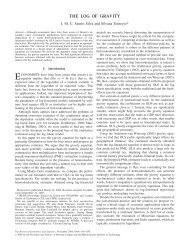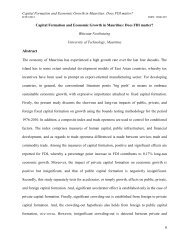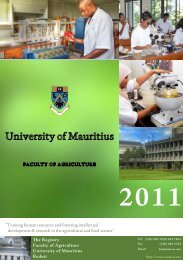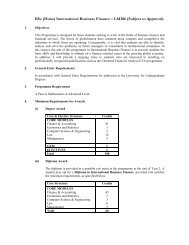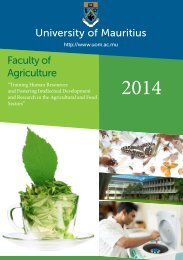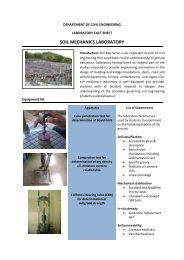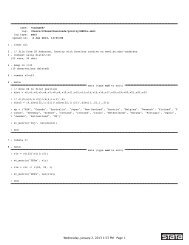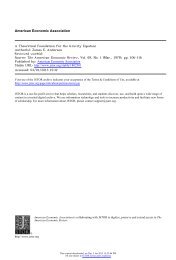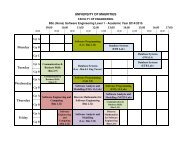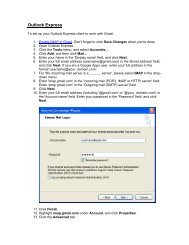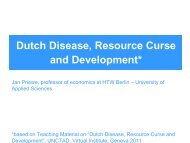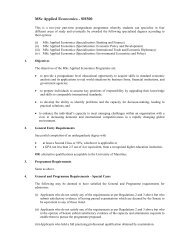SACU Revenue Sharing Formula - the University of Mauritius
SACU Revenue Sharing Formula - the University of Mauritius
SACU Revenue Sharing Formula - the University of Mauritius
Create successful ePaper yourself
Turn your PDF publications into a flip-book with our unique Google optimized e-Paper software.
ICITI 2012 ISSN: 16941225In 1925 South Africa, exercising its rights under <strong>the</strong> 1910 agreement, passed <strong>the</strong> highlyprotective Customs Tariff Act in an attempt to industrialize its own economy and significantlyraised its external tariff (Lumby, 1983). This had three effects that have been <strong>the</strong> focus <strong>of</strong>revenue sharing debates between <strong>the</strong> <strong>SACU</strong> members ever since. First, <strong>the</strong> move would decrease<strong>the</strong> revenue pool for <strong>the</strong> BLS as more goods were produced in South Africa ra<strong>the</strong>r than imported.Second, it would cause trade diversion to higher cost production inside <strong>the</strong> customs union andlastly it would fur<strong>the</strong>r exacerbate <strong>the</strong> economic polarization that is normal when such partners <strong>of</strong>vastly unequal production capabilities enter a customs union. At <strong>the</strong> same time as South Africawas protecting its own industry in <strong>the</strong> mid-1920‟s it was prohibiting <strong>the</strong> only export thatBatswana could export, namely cattle through weight restrictions (Ettinger, 1972). The weightlevels (1,000 lbs for oxen, 750 for cows) were set at levels that white farmers in Bechuanalandcould meet but were generally not possible for traditional Batswana cattle farmers. All that wasleft was for Batswana to export was <strong>the</strong>ir labour to <strong>the</strong> South African mines.By 1968, just prior to <strong>the</strong> negotiations with South Africa, <strong>the</strong> share <strong>of</strong> trade <strong>of</strong> <strong>the</strong> BLShad risen to 4.1% <strong>of</strong> <strong>the</strong> total <strong>SACU</strong> imports while <strong>the</strong> revenue share remained 1.3% unchangedfrom <strong>the</strong> 1910 formula 9 . From <strong>the</strong> South African perspective, its share <strong>of</strong> <strong>the</strong> RSF was seen asimmutable but from <strong>the</strong> perspective <strong>of</strong> <strong>the</strong> BLS <strong>the</strong> revision was seen as vital to an equitableredistribution <strong>of</strong> benefits <strong>of</strong> <strong>the</strong> customs union. Whe<strong>the</strong>r <strong>the</strong> BLS were in effect subsidizingSouth Africa at <strong>the</strong> end <strong>of</strong> <strong>SACU</strong> 1910 agreement cannot be known without a detailed analysis <strong>of</strong><strong>the</strong> applied tariffs and <strong>the</strong> composition <strong>of</strong> trade 10 . It was certainly <strong>the</strong> view <strong>of</strong> commentators at<strong>the</strong> time that Botswana could affect a superior revenue arrangement outside <strong>of</strong> <strong>SACU</strong> atrelatively low cost. However, <strong>the</strong> view <strong>of</strong> <strong>the</strong> British government had long been that <strong>the</strong> 1910formula had provided <strong>the</strong> BLS a disproportionate share <strong>of</strong> benefits simply by virtue <strong>of</strong> <strong>the</strong> factthat <strong>the</strong> rate <strong>of</strong> economic growth in South Africa had been much faster than in <strong>the</strong> BLS and<strong>the</strong>refore a formula which provided <strong>the</strong> BLS with a fixed percentage <strong>of</strong> a rapidly growing importbase was certainly more than could o<strong>the</strong>rwise be achieved by <strong>the</strong> BLS from individual tariffregimes.b) Independence <strong>of</strong> Botswana, Lesotho and Swaziland and <strong>the</strong> 1969 RenegotiationsThe renegotiation <strong>of</strong> <strong>the</strong> 1910 <strong>SACU</strong> agreement in 1969 which occurred following <strong>the</strong>independence <strong>of</strong> Botswana, Lesotho and Swaziland saw a fundamental shift in <strong>the</strong> position <strong>of</strong>South Africa and a greater willingness to <strong>of</strong>fer a RSF that was more closely linked to <strong>the</strong>negative externalities <strong>of</strong> <strong>the</strong> customs union. The position that <strong>the</strong>re were substantial net benefits<strong>of</strong> <strong>SACU</strong> to Botswana was a position maintained by <strong>the</strong> UK government untilindependence 11 .The views <strong>of</strong> <strong>the</strong> independent government <strong>of</strong> Botswana were quite different fromthat <strong>of</strong> <strong>the</strong> British government as <strong>the</strong> perception was that trade diversion along with polarizationsignificantly outweighed <strong>the</strong> benefits <strong>of</strong> not having to pay for a customs administration. Prior to<strong>the</strong> 1969 negotiations <strong>the</strong>re had been considerable analysis undertaken by <strong>the</strong> Botswanagovernment on <strong>the</strong> implications <strong>of</strong> leaving <strong>SACU</strong> as well as intensive consultations amongst <strong>the</strong>BLS. The Botswana government‟s first development plan issued on Independence Day in 1996,made <strong>the</strong> government‟s desire to negotiate a more equitable arrangement very clear 12 . In <strong>the</strong>final analysis what was negotiated was a radically different RSF from that <strong>of</strong> 1910 or any o<strong>the</strong>rcustoms RSF because it removed <strong>the</strong> linkage between <strong>the</strong> revenue derived by <strong>the</strong> BLS from <strong>the</strong>size <strong>of</strong> <strong>the</strong> total revenue pool. Importantly, <strong>the</strong> new RSF was based not on <strong>the</strong> share <strong>of</strong> extra-4



